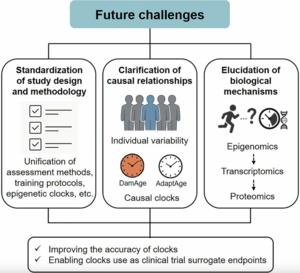Overview
- A research perspective led by Takuji Kawamura in the journal Aging synthesizes evidence linking regular, goal-oriented workouts and high cardiorespiratory fitness to decelerated or potentially reversible epigenetic aging.
- Epigenetic clocks estimate biological age by analyzing DNA methylation patterns, offering molecular insights distinct from chronological years.
- Human intervention trials have demonstrated measurable reductions in epigenetic age, including an eight-week combined aerobic and strength program that lowered biological age by about two years in sedentary middle-aged women.
- Animal experiments and cross-sectional studies indicate that endurance and resistance training can slow molecular aging in skeletal muscle, heart, liver, adipose tissue and gut, with Olympic-level athletes showing especially low epigenetic age.
- Authors stress the need for longer-term, mechanistic trials to explain individual and organ-specific responses and to develop personalized exercise prescriptions for anti-aging benefits.

